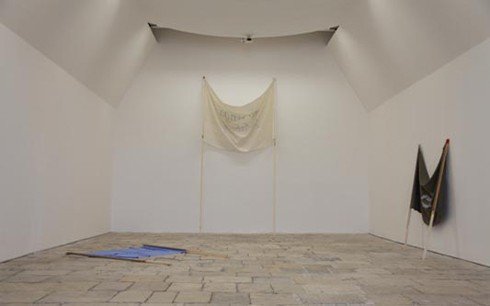Mark Mangion has taken it upon himself to promote the contemporary visual arts in Malta. He has worked with innumerable local and foreign artists and established himself as one of the leading participants in the contemporary scene.
He talks to Babelmed about his new experience directing the Malta Contemporary Art 'space' at Sta James Cavalier Centre for Creativity, Valletta.
How would you describe living in Malta?
Living in Malta is full of contradictions. While there is a great quality of life and an ease with which things can be done, there is still a real inadequacy in appreciation for contemporary culture and the will to move forward. Valletta, the capital is a splendid city which never ceases to intrigue me. After having lived most of my adult life in large cities, I find Valletta to be a great balance of the local while retaining a certain anonymity. Living in Malta surrounded by its natural and architectural beauty knowing that we are in a time of great potential change excites me. When the frustration at the slowness of embracing change sinks in, the reality of the Mediterranean problem creates the urge for departure.
You have lived in Malta but chose to further your studies in London and New York. Why this decision and how common is it amongst young Maltese artists?
I left Malta in 1994 at age 18. I always felt a certain disconnection with the country I grew up in. I guess the conservative nature and the fact that the infrastructure for what was most important to me and my growth; art, film, music, progressive living, made me want to leave and explore. Of course this is important for anyone even citizens of a big city. The idea of understanding the self and other are facilitated through exposure to other places.
New York City and London were English speaking places and both had a great history of embracing the new. They also great art schools with tremendous exposure so the greatest art of the moment and the past.
The wealth of information, influences and independence that I built up in these two cities were significant and so I would highly recommend Maltese artists to leave their little island and see the world. It doesn't have to be these two cities of course.
Why do they (young Maltese artists) have to go abroad?
I think broadening one's mind is very important. whether one does it virtually or through film and literature, or whether one physically travels. I think artists especially need to extract themselves from a very strong national heritage and gain a greater artistic independence, which will ultimately make their language more sophisticated and relevant.
Can you find/name 3, 4, 5, ... good reasons why an artist should live and work in Malta?
The Climate in Malta is fantastic.
Halfway between North Africa and Europe and with contrasting influences such as the british one, Malta is a strange and special place to work in.
I can't say that it's cheap anymore but yes still cheaper than most big cities, which is actually very important to an artist.
Malta is like a blank wall in Contemporary culture so there is great potential to build its new identity.
The golden rock.
A great ease at making things happen fast.
In an interview you gave to 'interartive.org' you said 'I constantly look for younger artists but I don't find them. I do find little "pockets" but they're very detached from certain realities. That's very problematic because there should be many more younger artists reacting to the environment.' What do you mean by this? or rather, do you really think there's a general feeling of apathy? and if so, why?
I think we are at an interesting time due to cheaper travel, the internet and Malta being generally less disconnected. However, I felt that in my generation there seemed to be very few artists really exploring the discourse of contemporary art in very engaging ways. I do feel the emerging generation have greater opportunities but I do really feel a sense of apathy.
I guess the main problem is that lack of general infrastructure for the artist to measure up to.
With no art school, very few professional artists, writers, curators and galleries, then young artists are dissuaded from continuing their practice at a higher level. Although art always finds its way through shortcomings and I just don't see enough reaction to the situation.
The MCA has become a point of reference for all those looking for fresh, contemporary works. What have been your major challenges so far?
The major challenge of course has to be funding. Getting appropriate funding in Malta from government, and the private sector is very hard.
Of course presenting contemporary work to the Maltese public has its challenges since many of them have had very little exposure to this type of work. However I feel things are changing. This is positive.
Creating a curiosity and a critical discussion is never easy even in the big city.
Where do you want to take MCA? What are your projects for the future?
I would like to see MCA constantly changing and reinventing itself. I would like to see it grow but not too much. I am a little anti disneyfication of the gallery/ museum so small and manageable and constantly challenging is good. I wish we had better funding however.
I would like to set up a Malta Triennial, a critical journal, a digital artist film archive and production house as well as the setting up of a practice and research based residency programme.
We have also started a public arts project programme and I would very much like to see this expand.
I would ultimately like MCA to have its own premises and be properly funded by Malta. I believe we have offered Malta a lot and we can continue to do so but we need support.(ÇT)







